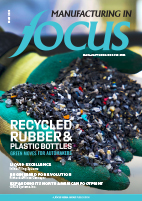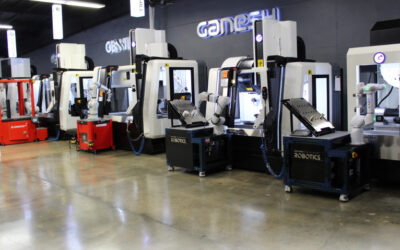Genics is based in Acheson, Alberta, just two miles west of the province’s capital city of Edmonton andisprovides a line of products which are safe, better for the environment, and help to extend the service life of wooden utility poles, and other wood products in the log home, construction and treated dimensional lumber industries.
~
To help pay their way through university, brothers Wes and Cal Wall began working in the wood preservation industry, testing and treating wood power poles with various chemicals. Wes was a student in the University of Alberta’s agriculture program at the time and realized how harmful to both the user and the environment the remedial treatment pastes and fumigants like methyl isothiocyante were. Although these products were effective as wood preservatives against rot, fungus, and insects, the brothers knew there must be environmentally-friendly solutions to extend the lifespan of these wooden poles.
“That was the big push,” says Genics Inc. Research and Development Manager Shekaib Adab. Adab has a background in science and started much like the Wall brothers, working in the test and treat field. He has now been with the company for almost nine years. “Using all these nasty chemicals, the idea came to Cal and Wes that there must be a better, safer alternative not just for the worker but the environment and the people who might inadvertently be exposed to the chemical, like the farmer whose field you install the product in. That was the model for the company, to come up with effective and environmentally-friendly products and solutions that work without exposing people, animals, and the environment to any potentially harmful chemicals.”
The pair, committed to doing better, founded Genics Inc. in 1981. Led by company co-founders Cal and Wes Wall, Genics actively researches and develops new products. The family-owned and operated company has a full-time staff in the winter of about thirty-five to forty employees, growing to seventy-five in the summer months, when out in the field performing inspections and installations.
Genics manufactures wood preservatives and fire retardants on-site in Acheson and has proven itself to be a pioneer in the development of safe, responsible products treating wood and an expert in wood inspection and testing services.
“The chemicals in our product catalogue are all remedial treatments,” says Adab. “The chemical you see on the surface of a wooden pole, like creosote or CCA, comes pre-treated on a pole before installation. Our products are designed to extend the life of that pole, so it doesn’t need to be replaced after thirty years. This way, you can use the same tree for eighty years, rather than replacing it every thirty and can offset quite a bit of your carbon footprint as a utility company. We help extend the life of that pole by providing remedial treatments that help protect the pole at the highest risk areas for decay and degradation, between 6” above ground line to 18” below ground line and the pole top.”
Genics carries a range of utility pole, building, specialty, and do-it-yourself products to meet the needs of its customers. Every one of the company’s manufactured goods are either copper or boron-based; most are a co-biocide of both, resulting in extremely effective products that are ultra safe for both the handler and the environment. Genics’ number one product, the Cobra Rod, embodies these traits. It is a dissolvable glass rod designed for the internal treatment of wood, comprised of fused anhydrous Copper and Boron, making handling and installation extremely safe, clean and efficient.
Genics has served utility companies in Canada and the United States for the past thirty-seven years. It supplies not only pastes, rods and wrap bandage for the utility sector, but also fire protection products, liquid preservatives, tooling, tags, and other accessories used for testing, treating and data collecting. On the construction side, the company’s range of products are used to preserve wood by protecting against pests, mould and fire damage. And for homeowners, the company carries products to treat fences, log homes, decks, and more.
To ensure products meet strict safety guidelines, they are subject to quality assurance (QA) and quality control (QC) testing in-house for all manufacturing. The company’s products are registered with the Environmental Protection Agency (EPA) and the Pesticide Management Regulatory Agency (PMRA), the governing regulatory bodies for the United States and Canada. This verifies that the goods have undergone stringent science-based evaluations to ensure they pose minimal risks to human health and the environment, and have been deemed safe for use and sale in the two countries.
“In the remedial world, there is still a lot of harmful stuff out there,” says Jesse Clark, who has been with the company for five years and general manager since last October, “so our push has been to change that by offering product solutions that don’t require installers to wear full hazmat suits to apply treatment to a pole. Through 100 percent organically certified active ingredients, our products out-perform and out-last harmful fumigants and solvent-based liquids and pastes.” And since Genics products are safe to handle, there is little preparation required before application or clean-up afterwards.
The company’s head office, sales office, manufacturing plant, and warehouse are in Acheson, and it has a distribution warehouse in Kansas City. Genics is also involved with a number of prestigious universities and accelerated environmental testing. The company rents a small plot of land in Hilo, Hawaii – which has a rainforest climate and sees average annual rainfall from 130 inches to 300 inches on the wettest part of the Island – to rigorously test its products. “The location in Hawaii is for research on wood preservatives,” says Adab. “It’s a great spot due to the combination of heat and moisture. You get 230 inches of rainfall roughly a year at the test plot; combining that with the temperatures and biodiversity of micro-organisms in Hilo, it’s great for studying biodegradation of wood and wood preservatives.”
The site in Hilo is able to expedite test results owing to the incredible amounts of rainfall, temperature, and microorganism biodiversity. It is ranked as a Zone 5 region on the Fungal Decay Hazard Map, which indicates severe decay on a ranking system of 1-5, with 5 being areas that are conducive to decay and higher fungal activity. Other areas that are ranked as a decay Zone 5 are Louisiana and Mississippi, and these are all areas where the company conducts research. “We want to test in the worst possible conditions,” states Adab. “That way, when your data comes out, you can prove you are successful at preventing wood decay and fungal activity in the absolute worst conditions.”
In addition to extensive testing of its products in Hawaii, the company has relationships with utilities, chemical manufacturers, and universities known for their wood sciences programs, such as the Louisiana State University (LSU), where it has had wood poles and products installed for the past few years. Genics works with other institutions, such as Mississippi State University (MSU), in areas that are highly susceptible to termites, fungal activity, and decay. Some, like MSU, conduct research for them, while others, like Oregon State University (OSU), are part of a co-operative program. Closer to home, Genics has worked with the University of British Columbia (UBC) studying mould and fungus and is involved with the University of Alberta’s engineering faculty and is running student projects. Data gathered from testing in Hawaii and universities is invaluable.
“For the sake of doing right by the industry, you want a lot of third-party validation on your products, because otherwise, the data could seem to have bias if you do the test yourself,” says Clark. “There are zero doubts when the data is also backed and validated by third-party labs and research institutions.” Genics is also involved in studies and testing with FPInnovations, a Canadian non-profit organization that performs research in the forest industry.
Genics is continually expanding its line of superior-quality wood protection products and has created several new items. These include a pole top protector. This membrane can be wrapped around the top of a utility pole to prevent growth of incipient decay, and protect it from the elements, including organic matter from birds. “A lot of utilities are finding now they have failing poles early because of pole top decay, so we developed this product that you can use on the top,” states Adab. “It is an elastomeric membrane that you wrap around the top of the pole, and comes with a copper and boron delivery system that will sit on the center of the top of the pole. The idea is to create a barrier between the pole top and the environment, and deliver a known preservative system to the top to stop any incipient decay and fungal activity.”
Other recent products include CuB 20, a preservative paste or liquid composed of a copper borate synergy used to prevent incipient decay and stop the progressive breakdown of wood. This product can be applied externally to wood surfaces or used internally through injection.
Genics is growing and gaining clients across the U.S. and Canada because it provides environmentally-friendly solutions that are highly effective. “We want to educate people on safe and effective wood preservatives that aren’t harmful to the user, the soil, or the environment,” states Clark. “We’ve made huge strides with our products in some of the most scrutinizing and environmentally conscious states and provinces on the continent, including California, North Carolina, British Columbia and Quebec. These markets are very difficult to get into because of their extensive rules and regulations for chemical treatments and how they affect people and the environment. We are hoping that building strong rapport with these scientific and environmentally conscientious leaders will show people what we are all about in providing safe and effective wood protection solutions.”













